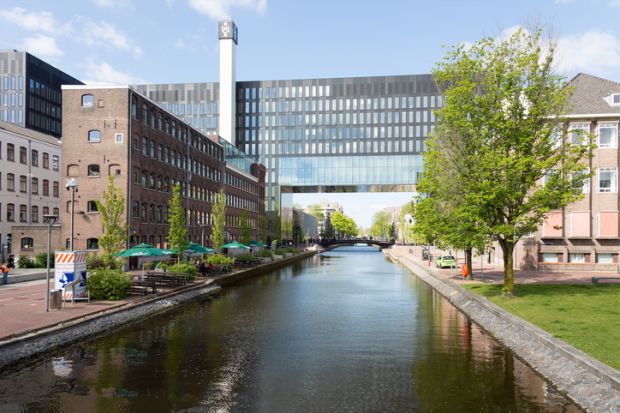The University of Amsterdam (UvA) will close for two days, its executive board has announced, after riot police shut down a pro-Palestinian protest on its Roeterseiland campus.
The protest on 13 May, one of several over the past week, began with a peaceful walkout by university students and staff, Dutch national broadcaster NOS reported, with protestors calling on UvA to cut academic ties with Israel. The university said in a press release that many demonstrators left after the walkout, while new people joined those who remained, some wearing masks.
Protestors subsequently entered a university building, with some setting up tents and using office furniture to build barricades. According to UvA, the barricades obstructed entrances and exits, “creating an unsafe situation for everyone on the premises”, while some demonstrators engaged in “deliberate vandalism”.
On the university’s request, riot police arrived to break up the protest, with a video posted by The Guardian showing them using batons and shields to push back demonstrators. UvA has filed reports of vandalism and trespassing, police said in a statement.
“The executive board of the University of Amsterdam is shocked at the way a peaceful protest has been hijacked by violent elements who misuse their ‘right to demonstrate’ and deny the fundamental rights of others, including the media,” the university’s statement read. “It is unacceptable that people working or studying at the UvA are harassed, threatened and forced to leave their place of work or study.”
Citing an inability to guarantee “the safety of all those on campus”, the executive board said teaching would be suspended on 14 and 15 May, while all campus buildings would be closed. Board chair Geert ten Dam told NOS that the university would no longer negotiate with activists.
Last week, UvA’s Central Student Council called for the resignation of the university’s executive board and the issuance of a public apology over their response to the ongoing protests. Stating that police had “subjected [protestors] to brutal beatings” that required several to get stitches, the council said that “negotiations were not given due consideration, and the use of police violence was far from being a last resort on [UvA’s] part.”
“We want to reaffirm our firm position against police presence at student protests, as they have shown time and time again to lead to unnecessary violence,” the council said. “The university should facilitate protests instead of suppressing our rights as members of a free academic community.”
On Tuesday, the umbrella bodies Universities of the Netherlands (UNL) and the Association of Universities of Applied Sciences published joint guidelines for protests, stating that institutions would not negotiate with protestors wearing face coverings and should prohibit overnight stays and the occupation of buildings. The guidelines also say that demonstrators may be asked to show their IDs.
“It is very understandable that our students and employees are seriously concerned about the situation in Gaza. Protesting must therefore also be possible,” interim UNL chair Jouke de Vries said in a statement. “At the same time, we are also responsible for the safety of our people and therefore want to make it very clear what is and is not allowed in and around our buildings.”




